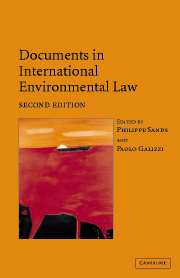Book contents
- Frontmatter
- Contents
- Preface
- PART I General instruments
- PART II Atmosphere
- PART III Oceans: global
- 8 London Convention on the Prevention of Marine Pollution by Dumping of Wastes and Other Matter, 29 December 1972
- 8A Protocol to the Convention on the Prevention of Marine Pollution by Dumping of Wastes and Other Matter, 7 November 1996
- 9 International Convention for the Prevention of Pollution from Ships, 2 November 1973
- 9A Protocol of 1978 Relating to the International Convention for the Prevention of Pollution from Ships 1973, 17 February 1978
- 10 United Nations Convention on the Law of the Sea, 10 December 1982 (extracts)
- 11 Agreement for the Implementation of the Provisions of UNCLOS Relating to the Conservation and Management of Straddling Fish Stocks and Highly Migratory Fish Stocks, 4 December 1995
- PART IIIB Oceans: regional
- PART IV Freshwater resources
- PART V Biodiversity
- PART VIA Hazardous substances and activities: nuclear
- PART VIB Hazardous substances and activities: pesticides
- PART VIC Hazardous substances and activities: waste
- PART VII Human rights and the environment
- PART VIII War and the environment
- PART IX Trade and the environment
- PART X Environmental impact assessment and access to information
- PART XI Liability for environmental damage and breaches of environmental obligations
- PART XII The Antarctic
8A - Protocol to the Convention on the Prevention of Marine Pollution by Dumping of Wastes and Other Matter, 7 November 1996
Published online by Cambridge University Press: 05 June 2012
- Frontmatter
- Contents
- Preface
- PART I General instruments
- PART II Atmosphere
- PART III Oceans: global
- 8 London Convention on the Prevention of Marine Pollution by Dumping of Wastes and Other Matter, 29 December 1972
- 8A Protocol to the Convention on the Prevention of Marine Pollution by Dumping of Wastes and Other Matter, 7 November 1996
- 9 International Convention for the Prevention of Pollution from Ships, 2 November 1973
- 9A Protocol of 1978 Relating to the International Convention for the Prevention of Pollution from Ships 1973, 17 February 1978
- 10 United Nations Convention on the Law of the Sea, 10 December 1982 (extracts)
- 11 Agreement for the Implementation of the Provisions of UNCLOS Relating to the Conservation and Management of Straddling Fish Stocks and Highly Migratory Fish Stocks, 4 December 1995
- PART IIIB Oceans: regional
- PART IV Freshwater resources
- PART V Biodiversity
- PART VIA Hazardous substances and activities: nuclear
- PART VIB Hazardous substances and activities: pesticides
- PART VIC Hazardous substances and activities: waste
- PART VII Human rights and the environment
- PART VIII War and the environment
- PART IX Trade and the environment
- PART X Environmental impact assessment and access to information
- PART XI Liability for environmental damage and breaches of environmental obligations
- PART XII The Antarctic
Summary
Editorial note
The 1996 Protocol will replace the 1972 London Convention once in force. Twenty-six ratifications or other expressions of consent by States are required before the Protocol will enter into force; and at least 15 of these must come from Contracting Parties to the Convention (Article 25(1)). The objective of the 1996 Protocol is to ‘protect and preserve the marine environment from all sources of pollution’ and, to this end, Contracting Parties are required to take effective measures to prevent, reduce and where practicable eliminate marine pollution caused by dumping or incineration at sea (Article 2). In respect of internal waters, each Contracting Party has a discretion either to apply the provisions of the Protocol or to adopt ‘other effective permitting and regulatory measures to control the deliberate disposal of wastes or other matter’ where such disposal would be ‘dumping’ or ‘incineration at sea’ within the meaning of the Protocol (Article 7(2)). The purpose of the Protocol is similar to that of the 1972 London Convention, but the Protocol is more restrictive: application of a ‘precautionary approach’ to environmental protection from dumping of wastes or other matter is included as a general obligation (Article 3(1)); a ‘reverse list’ approach is adopted where by Contracting Parties are required to prohibit the dumping of ‘any wastes or other matter’ with the exception of those listed in Annex 1, which require a permit; (Article 4(1) and 4(2)) incineration of wastes at sea is prohibited (Article 5); and the export of wastes or other matter to other countries for dumping or incineration at sea is banned (Article 6).
- Type
- Chapter
- Information
- Documents in International Environmental Law , pp. 252 - 274Publisher: Cambridge University PressPrint publication year: 2004



